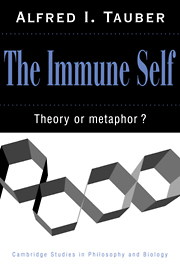Book contents
- Frontmatter
- Contents
- Acknowledgments
- Introduction
- 1 The phagocytosis theory
- 2 The triumph of immunology
- 3 The immune self declared
- 4 From theory to metaphor
- 5 Immunology gropes for its theory
- 6 The self and the phenomenological attitude
- 7 The self as organism: A philosophical consideration
- 8 The search for identity
- Notes
- References
- Index
2 - The triumph of immunology
Published online by Cambridge University Press: 14 January 2010
- Frontmatter
- Contents
- Acknowledgments
- Introduction
- 1 The phagocytosis theory
- 2 The triumph of immunology
- 3 The immune self declared
- 4 From theory to metaphor
- 5 Immunology gropes for its theory
- 6 The self and the phenomenological attitude
- 7 The self as organism: A philosophical consideration
- 8 The search for identity
- Notes
- References
- Index
Summary
A BIOLOGY BASED ON THE WHOLE
The conflict between Metchnikoff and the humoralists must be regarded as a particular case of a more general struggle surrounding the ascendency of reductionism, defining both the research strategies and the metaphysical foundations of biology and medicine in general. Reductionism was declared as the program of German physiology in the 1840s to combat vitalism and establish the exclusive domain of physics and chemistry as the sciences to describe the living realm (Galaty 1974' Gregory 1977' Lenoir 1982' Kremer 1990). The application of physicochemical theory and methods to biology has a clear history dating from the end of the eighteenth century in the maturation of combution theory (Lavoisier), the application of atomic proportions (Jeremias Richter and Dalton), and the extension of inorganic chemistry to organic matter. More broadly the reductionist program in physiology arose from the growing appreciation that energy was interconvertible from one form to another and was conserved. As fundamental laws governing physical forces were defined for electrical, chemical, and mechanical energies, biologists would seek to place organic functions within the same scientific construct. Thus, the initial efforts to formalize the research agenda of physiology to chemistry focused on the problem of accounting for animal heat. In the process teleology and holism (the latter we would describe as organismic biology) were assaulted as allied, if not intimately linked, with the vitalistic doctrine. In the twenty-five-year period of 1883-1908 (the years of Metchnikoff's active immunology career), the emergence of new standards and expectations can be discerned in almost all biological disciplines, molded by what might well be regarded as a modern-age scientific ethos.
- Type
- Chapter
- Information
- The Immune SelfTheory or Metaphor?, pp. 44 - 80Publisher: Cambridge University PressPrint publication year: 1994

